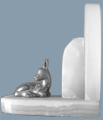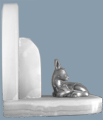 |
.............................. |
 |
| Novedades |
| Biografía |
| Biography |
| Libros en español |
| Works in English |
| Textos |
| Works |
| Fotografía |
| Photography |
| Entrevistas |
| Contacto |
WorksProse
...................................................................................................
Edgar Brau
The Blessing
Translated by Joanne M. and Donald A. Yates
Our Presidential residence is situated in the very center of the Capital, and two or three blocks of luxurious mansions surround it like protective rings. Continuing outward from these homes, the humbleness of the outlying dwellings accelerates at an extraordinary pace. At a distance of five blocks they are little more than shacks, and at the periphery, they are miserable hovels.
A geometric garden, dotted here and there with flower beds, encircles the central building —almost a hundred years old and ornately Italian. For some time now, the garden has attracted the gazes and murmurings of the citizens on account of a strange ceremony that unfolds on its paths each evening. What happens is that as soon as he finishes his dinner, the President goes out into the garden accompanied by an aide-de-camp who carries a silver tray with a revolver on it. When they arrive at the head of the main path, the aide-de-camp presents the tray to the President, who, in the meantime, has pulled on some silk gloves. The President takes the gun, examines it, nods in approval, and then, as he begins strolling around the grounds, fires it overhead. The pauses between one discharge and the next are regular, almost exactly timed, and the President stops only for the aide-de-camp to load the gun once its chamber has been emptied.
When the first shot rings out, the poorest people go out into the patio or porch of their homes and stay there, waiting expectantly. Those who have children, line them up on a bench and make them sit there. So as not to be late, the crippled take their places one by one a little early and ease their wait by quietly reciting certain conciliatory prayers. And after a while, when the shooting ceases, everyone starts asking who could be the lucky one who managed to be wounded by the President...
And yet, it hasn´t been long since people used to tremble when the shooting began (which apparently helped the President to relax and manage a good night´s sleep) and no one dared to go into the street for fear of being “blessed by the President´s bullet,” as they used to say jokingly. But one night, while her parents were distracted, a little girl went out onto the patio of her home, curious about the gunshots. After awhile, her mother noticed she was gone and ran out to find her. But it was too late; the little girl was lying on the ground, bleeding. She wasn´t dead, however, because the bullet had only struck her in the arm. They were humble people; they carried the girl to a hospital and merely asked that she be helped. But even at that, the word spread until it reached the President himself. So that one fine day an enormous black automovile pulled up in front of the little girl´s house, and she and her parents promptly got out of the back seat, smiling and loaded down with packages. The girl´s arm was bandaged, but she looked just fine.
Immediately the whole neighborhood converged on the home where the auto was parked. The house was filled to overflowing with friends from the neighborhood and the relatives who had waited for the family´s arrival. The girl´s mother didn´t leave out a single detail in describing the staff´s attentions at the luxurious clinic, in explaining the scholarship that the President had awarded her daughter, and in displaying all the gifts. Meanwhile, her husband was telling these astonished visitors about his new job, which was also a part of the compensation for the child´s accident. And the presence of the uniformed chauffeur —who smiled as he drank a soda— seemed to make what the bedazzled parents described even more splendorous.
When the automobile left later on, the neighbors departed from the modest house in silence; the grownups among them appeared deep in thought. And even though no one said a word, that same night many of the children were obliged to look at the stars in the open air, while underneath their breaths, their parents prayed that they might receive the “blessing” of the President. Then there was a brief suspension in the routine firings: the presidential advisors needed time to persuade their leader to use the people´s anticipation of help to political advantage.
Over the months other incidents occurred, some of which were fatal. There were even one or two that were intentionally fraudulent —certain parents purposely wounded their own children— but this stratagem was countered when the President began using bullets specially marked in order to prevent false claims.
Later, when a vagrant was wounded, the category of “Adults” was created, which also necessitated creating an office for investigating the claims of those who somehow felt unfairly treated. Not long afterward, for example, a group of neighbors came forward to denounce certain opportunists who rented their backyards to people living further out, making them pay by the minute for their stay. Aware of the complaint and knowing that sooner or later they would be kicked out, those temporary tenants demanded in turn the use of a revolver with a better range than the one the President was in the habit of using. But to date no word has been released in this regard, although it has been decreed that the children of well-to-do families who are wounded (they compete with each other to expose themselves to the bullets) will not receive any compensation. At the same time, the sale of certain talismans that supposedly attract bullets has been prohibited.
Humanitarian organizations had no choice but to make their displeasure known. But, although their reasons are completely worthy of consideration, it is ridiculous to think of suppressing the presidential custom. People have become so used to it, find so much hope and satisfaction in its existence (the cities outside the Capital are now demanding something similar), that it has become a virtual reason of state; perhaps the most important one. So much so, people say, that although apparently moved by the image of the wounded (detractors correct this, saying his image communicated to foreign countries is the real concern), the President had once more intended to halt the shootings, but an explicit threat from the Army stopped him. Others say that the President no longer does the shooting, and that some official takes his place; and they add that the President takes advantage of these moments to mingle with the people and share the risks. Those who deny this rumor, talk instead about officials disguised as the President, and about the electoral benefits in future elections. But these are all suppositions. Until now, no one has seen the President or any double in the streets. Indeed, the public even talks openly about their preference for a safe President who sends off bullets from his garden into the night. So the only thing that continues to be real, night after night, is the existence of a grassy path, traversed by a man who every so often raises his arm and, perhaps with a grimace, fires his gun.
From The Poem and Other Stories
ANTIGUA LIBRERÍA DE MARIE ROGET
Buenos Aires, 1992
...................................................................................................